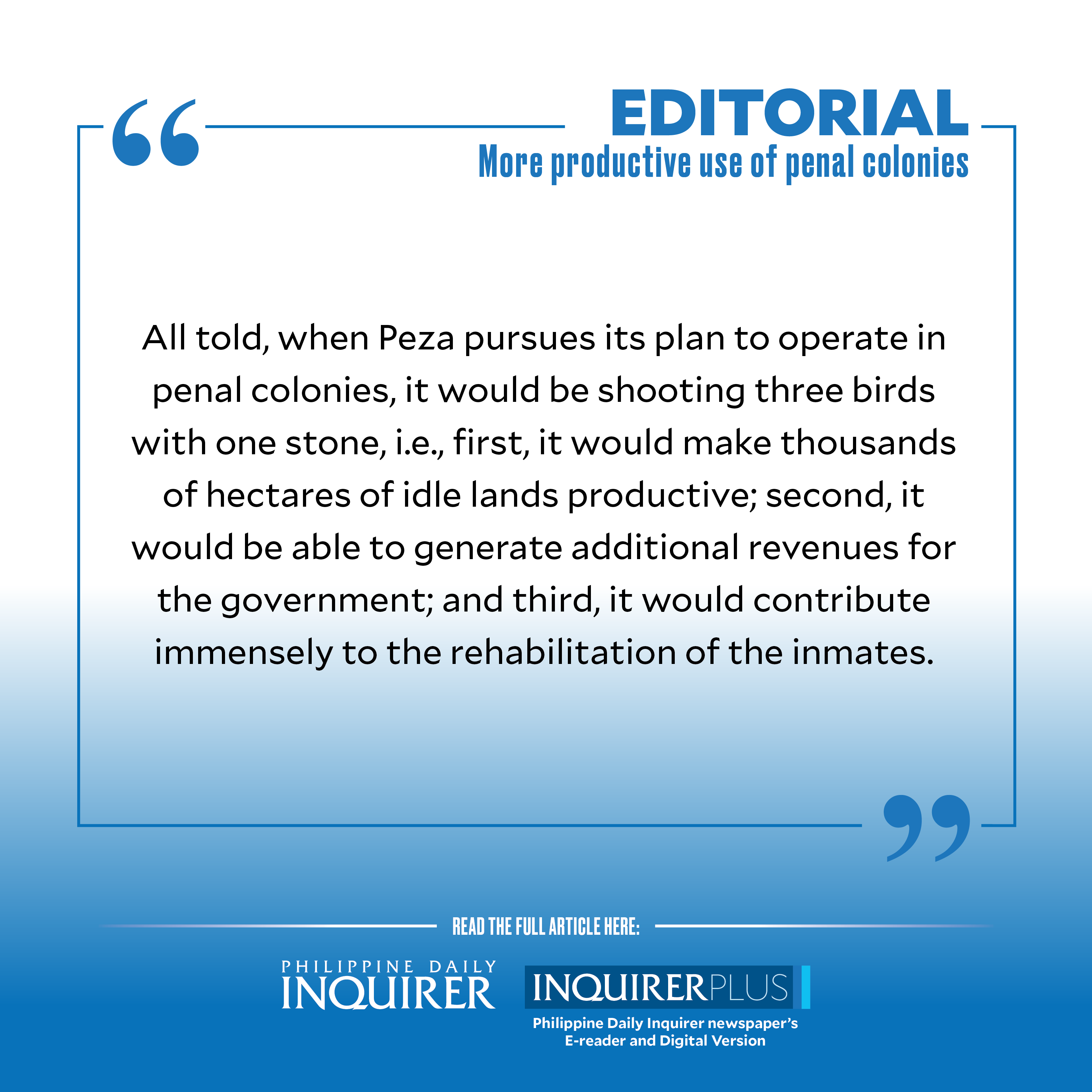More productive use of penal colonies

If plans do not miscarry, economic zones would soon operate in some of the country’s penal colonies.
The Philippine Economic Zone Authority (Peza) and the Bureau of Corrections (BuCor) recently signed a memorandum of understanding for the establishment of those zones on idle lands of penal settlements.
For starters, BuCor director general Gregorio Pio Catapang Jr. had said Peza could use around 25,000 hectares of the 28,000-ha Iwahig Prison and Penal Farm in Palawan that, according to Peza director general Tereso Panga, can be made operational in the next five years.
Catapang also mentioned the 7,000-ha penal farm in Sablayan, Mindoro Occidental, as another possible ecozone site. He further said the use of those properties would “help the government for food security and climate change adaptation and also make Peza a more viable institution.”
Aside from making those lands available for Peza’s use, BuCor is open to allowing the 3,000 prisoners in Iwahig, some of whom are living with their families, to work in the proposed ecozone.
Out-of-the-box
The idea of making use of idle lands in penal colonies may be described as an out-of-the-box approach to building ecozones with the least costs.
Since those lands are owned by the government and under its exclusive control, Peza would not have to worry about right-of-way, fair compensation, and displacement of illegal land occupants, if any.
There would be no need to invoke the government’s power of eminent domain in case private property has to be taken over if its owner refuses to part with it at a fair price.
Besides, those issues are prone to political interference if the lands involved are owned by influential government officials or their relatives, or occupied by their political supporters.
What’s more, the start-up costs in making the area suitable for export processing work would be lower because Peza would not have to undertake extensive clearing operation prior to the construction of the needed infrastructure.
‘Trickle down’ effect
The ecozones (which were formerly called export processing zones) had proven their worth as important sources of revenues and job opportunities since their initial start at the Bataan Export Processing Zone in 1972.
In the ecozones that followed, the local government officials of the municipalities that hosted them made sure that, to the extent possible and depending on the skills requirements of the companies, their employees were sourced from their constituencies.
And those companies were happy to oblige because, first, they stay in the good graces of those officials and are therefore assured of their assistance in case they need it; and second, it gives the employed residents a sense of belonging to the company which is beneficial to the maintenance of peace and order in the work premises.
It is common knowledge that when there is significant commercial activity in an ecozone, the money its employees earn and spend has a “trickle down” effect on the community.
That results in the creation of peripheral businesses, such as, merchandise stores and personal support services.
Rehabilitation
When the proposed ecozone in Iwahig becomes operational, it would make good business sense for Peza to seriously consider sourcing some of its workers from the penal farm.
Note that the Iwahig inmates are not the hardened criminal type, or prisoners who cannot be left unguarded or have to be constantly monitored lest they commit heinous crimes.
In Iwahig, which has been described as “a prison without bars,” they can move freely, engage in the work they’re familiar with and are allowed to have their families stay with them.
To be eligible to that privilege, it is essential that they have already served their imprisonment with good conduct for a period equivalent to one-fifth of the maximum term of their sentence.
In other words, they can be expected to remain in good behavior if given the opportunity to work in the ecozone and, in the process, earn some money they can use after they have served their sentence.
The question is posed: If they are employed, how much should they be paid? For obvious reasons, they would accept any wages given to them that would be better than nothing. But that would smack of exploitation which BuCor cannot and should not be a party to.
Since they would be doing work that would bring profits to their employer, it is only fair that, at the very least, they should be paid the minimum wage rate applicable to Palawan.
All told, when Peza pursues its plan to operate in penal colonies, it would be shooting three birds with one stone, i.e., first, it would make thousands of hectares of idle lands productive; second, it would be able to generate additional revenues for the government; and third, it would contribute immensely to the rehabilitation of the inmates.
















